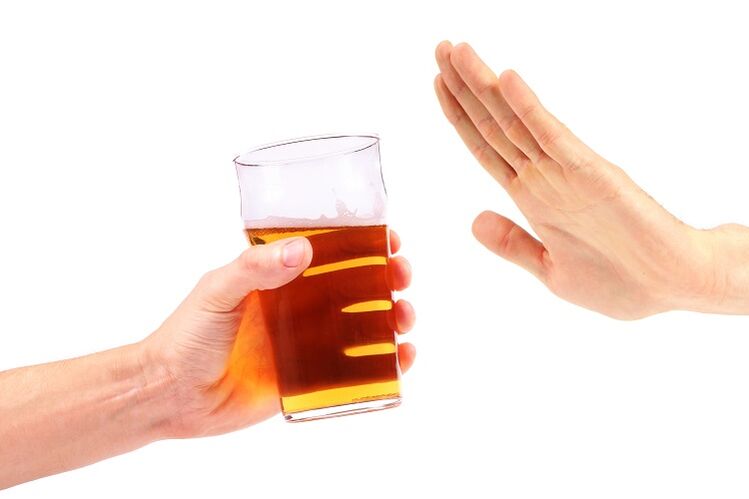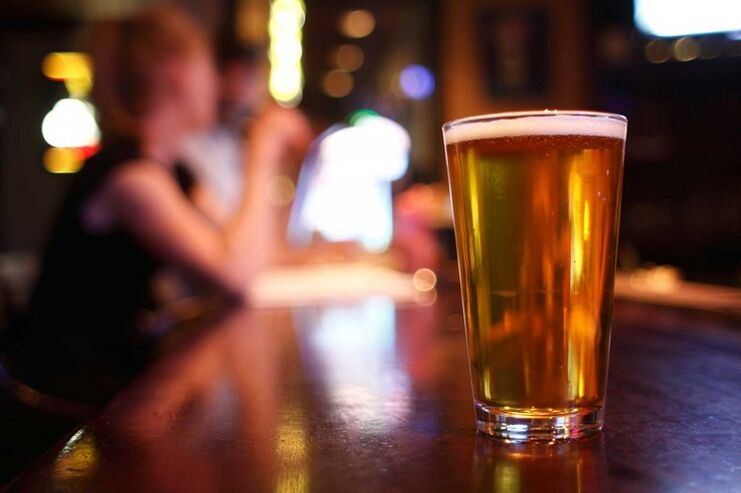At the end of a hard day at work, you want to relax with a glass of wine or a can of beer. Apparently, what would happen if you drank alcohol every day "for fun"?
The so -called "evening alcoholism" does not cause public disapproval. At first glance, nothing bad happened: there was no immediate withdrawal syndrome from a glass of vodka. But the frequent consumption of alcohol affects the human body, regardless of the "elite" of the drink. Young people, successfully aged 25-40, buy expensive cognac, not even realizing the last link in the alcohol chain that stands in the same line as them - undressed men who don’t shave with shabby clothes. If you signal that this is your possible future, they will definitely be offended. Yet, if a person drinks alcohol on a daily basis, soon they will have to pay not only with money, but also with health, family relationships, and position in society.
Disadvantages of ethyl alcohol
The amount of alcohol consumed in terms of pure alcohol should not exceed 5 ml / day (women) and 10 ml / day (men). It is best to divide it into several tricks. That is, 25 ml of liquor, 100 ml of wine, 250 ml of 3-4% beer drunk at the festive table will not bring harm to the female body (for men, the amount is multiplied). However, the frequency of use of "harmless" doses makes it dangerous.
The destruction of the body begins gradually. It directly depends on age, health, weight, hereditary predisposition. By coincidence of these factors, the first stage of alcoholism can occur in six months or a year. And someone who abuses alcoholic beverages will live the rest of his or her life with alcohol.

Psychic changes
Since daily alcohol consumption is intended to achieve a rapid psychotropic effect ("relaxation"), psychological dependence occurs first. After a week, a person gets used to relieving stress this way, without a break to contemplate, and after a year he forgets that it might be different.
The main symptoms of what is happening in the body:
- Insomnia. Although there is a strong hypnotic effect of ethanol, the healthy sleep phase is disrupted under its influence. Sleep becomes a narcotic, or vice versa - short, restless. After that, one must drink alcohol just to fall asleep.
- Nervous and irritable. The constant presence of alcohol in the blood causes oxygen starvation of the brain. Along with sleep disturbances, this causes fatigue, which provokes premature drinking. This is how the "vicious circle" is formed.
- Lowering the critical threshold. Someone starts to react strongly to comments ("Yeah, I always drink, but what’s awful about that? "), Constantly looking for new reasons to drink.
- Find a reason. Gradually, festive feasts and small doses were replaced with bountiful drinks on TV every evening. Patients are willing to blame the rest of the world for having an official reason to take another dose.
- Increasingly aggressive. In the first and second stages of alcoholism, most domestic crimes occur. Imaginary courage makes you seek adventure, this case often ends in fights.
Physiological changes
The consequence of long -term alcohol intake is an irreversible disorder in the body.
- Changes in blood composition. Literally a few hours later, glucose levels drop, thrombus formation increases, and blood circulation worsens.
- Avitaminosis. Against the background of general intoxication, vitamin deficiency seems to be a minor problem. However, gradually it causes hair loss, destruction of dental tissue, indigestion, and decreased immunity. Probably the development of anemia, early dementia, acute clinical depression.
- The effects of aging. The classic signs of alcoholism are swelling of the face, vascular "stars" on the cheeks, pale or purple-cyanotic skin. The person appears 10-15 years older than passport age. Women’s appearance changes especially quickly.
- Destruction of nerve cells and tissues of internal organs. Absorbed through the esophagus, ethanol with the bloodspread to every cell of the body, gradually affecting the liver, kidneys, stomach, brain.
Big belly and skinny legs - all the "joy" of beer alcoholism
Beer is one of the most dangerous drinks. The store offers a wide selection of various types, urgent ads for "cool". Initially a low level of psychological alertness, triggered by strong alcohol, led to an increase in domestic beer alcoholism.
Unlike vodka, beer has a lower calorie content, is more easily tolerated, and has a mild hangover syndrome. However, if you drink it every day, the effect will be the same.
The elements that beer contains affect hormone production. In men with beer addiction, breasts grow, fat is stored in the abdomen and sides, the tone of voice becomes higher, impotence develops. If a woman drinks a lot of beer, she acquires masculine characteristics: her voice is rough, the antennae begin to grow on the upper lip, her figure becomes masculine, masculine.
Beer alcoholism gradually damages the hormonal system. Infertility, tumors of the thyroid gland, aching pancreas - these are just a small list of problems from the abuse of fizzy drinks.
But beer has the most damaging effect on the heart. In people who regularly drink up to 3-5 liters of beer a day, the amount of heart muscle increases several times. An effect called "bovine heart" occurs, which doctors call cardiomegaly. Muscle tissue gradually deteriorates, shortness of breath appears, heart rhythm is disturbed. In the future, "cow's liver" threatens with serious complications.

It is important to remember that small doses of ethanol in beer lead to the formation of alcohol dependence. It's just harder to track.
Is there truth in alcohol?
Speaking of the relative use of grapes, doctors mean drinks that are products of grape fermentation, with a strength not higher than 13%. A glass of dry wine a week will do no harm.
Yet, excessive enthusiasm towards them has the same sad consequences that arise when drinking alcohol. Wine causes the destruction of the limbic system of the brain, which is responsible for memory and emotions. Alcohol abuse causes memory loss, dementia, premature dementia and impaired consciousness.
Red wine is contraindicated for migraines, high blood pressure, diabetes, gastritis. White grapes have a negative effect on the pancreas and nerve cells in the brain.
High -calorie dessert wines, a combination of sugar and preservatives exacerbate the negative properties of ethanol.
Champagne grapes, due to saturation with carbon dioxide, accelerate the absorption of alcohol into the blood. How much can a person drink at a festive table so as not to get drunk from champagne? Literally one glass. Furthermore, individual reactions are unpredictable.
Alcohol and chemicals
Can I drink low -alcohol beverages in conjunction with medication? The medical answer will be categorized: no!
Even "harmless" antipyretics such as aspirin and paracetamol, when combined with ethanol exposure, can cause sudden abdominal bleeding or anaphylactic shock.
While treating, it is a good idea to give up small doses of alcohol at night. Ethanol increases the resistance of pathogenic bacteria to antibiotics, increasing the side effects of many drugs. Moreover, the disease itself is contraindicated.
You can’t figure out what will happen if you drink alcohol along with taking medication. There is a high possibility of complications, to the point of death.
Memo for the environment
To be concerned if:
- your loved ones drink more alcohol each day (including low -alcohol beverages);
- become irritable, nervous;
- he has symptoms of intoxication (intoxication syndrome);
- complain of depression, insomnia, nightmares;
- no vacation at home passes without alcohol.
When the first symptoms appear, it is important to convey to the person the need for treatment. However, you should not talk to an alcoholic when he or she is under the influence of an intoxicating drink or is intoxicated. Choose the right time, do not insist, speak calmly, gently. Seek professional help if necessary.
Remember: if one partner drinks alcohol, there is a danger of the other partner becoming addicted.
























